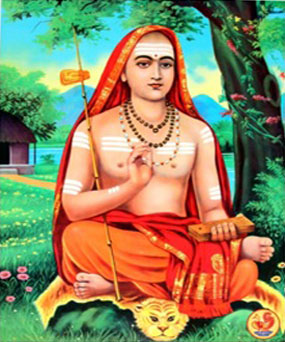
Sri Adi Shankaracharya (CE 788 - 820)
Shri Adi Shankaracharya or the first Shankara with his remarkable reinterpretations of Hindu scriptures, especially on Upanishads or Vedanta, had a profound influence on the growth of Hinduism at a time when chaos, superstition and bigotry was rampant. Shankara advocated the greatness of the Vedas and was the most famousAdvaita philosopher who restored the Vedic Dharma and Advaita Vedanta to its pristine purity and glory.
Shri Adi Shankaracharya, known as Bhagavatpada Acharya (the guru at the feet of Lord), apart from refurbishing the scriptures, cleansed the Vedic religious practices of ritualistic excesses and ushered in the core teaching of Vedanta, which is Advaita or non-dualism for the mankind. Shankara restructured various forms of desultory religious practices into acceptable norms and stressed on the ways of worship as laid down in the Vedas.
Philosophy of Adi Shankara
Shankara spread the tenets of Advaita Vedanta, the supreme philosophy of monism to the four corners of India with his 'digvijaya' (the conquest of the quarters).
The quintessence of Advaita Vedanta (non-dualism) is to reiterate the truth of reality of one’s essential divine identity and to reject one’s thought of being a finite human being with a name and form subject to earthly changes.
According to the Advaita maxim, the True Self is Brahman (Divine Creator). Brahman is the 'I' of 'Who Am I?' The Advaita doctrine propagated by Shankara views that the bodies are manifold but the separate bodies have the one Divine in them.
The phenomenal world of beings and non-beings is not apart from the Brahman but ultimately become one with Brahman. The crux of Advaita is that Brahman alone is real, and the phenomenal world is unreal or an illusion. Through intense practice of the concept of Advaita, ego and ideas of duality can be removed from the mind of man.
The comprehensive philosophy of Shankara is inimitable for the fact that the doctrine of Advaita includes both worldly and transcendental experience.
Shankara while stressing the sole reality of Brahman, did not undermine the phenomenal world or the multiplicity of Gods in the scriptures.
Shankara’s philosophy is based on three levels of reality, viz., paramarthika satta (Brahman), vyavaharika satta (empirical world of beings and non-beings) and pratibhashika satta (reality).
Shankara's theology maintains that seeing the self where there is no self causes spiritual ignorance or avidya. One should learn to distinguish knowledge (jnana) from avidya to realize the True Self or Brahman. He taught the rules of bhakti, yoga and karma to enlighten the intellect and purify the heart as Advaita is the awareness of the 'Divine'.
Shankara developed his philosophy through commentaries on the various scriptures. It is believed that the revered saint completed these works before the age of sixteen. His major works fall into three distinct categories - commentaries on the Upanishads, the Brahmasutras and the Bhagavad Gita.
Back to Philosophy